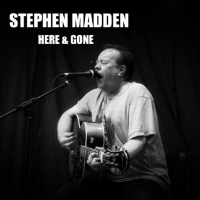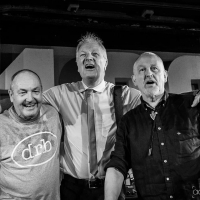'Here & Gone' by Stephen Madden
Review
Most articles I write for "Hot Music Live" tend to fall into a few broad categories and my main job is to try to be as objective as possible when describing music to you. This review however is a rare one: of a type I've never previously dealt with.
You will, I hope, have listened to the song "Juliet" which appeared on ‘Hot Music Live Presents Volume Eight' earlier this year. In the notes, I revealed that it was a foretaste for an album called ‘Here & Gone' by Stephen Madden. As you know, ‘Hot Music Live Presents Volume Three' was dedicated to his memory and so you'll not be surprised to learn that the album is a posthumous release put together by his friend & collaborator Keith Fabrique on Glasslip Records with the help of Danny Ansell, Cathy Beech, Eddie Bruneau and Sam Farrelly-Banks.
In technical terms, it would seem that some tracks were more finished than others and so must have received a range of treatments from remastering to actual completion: some in fact which Keith had co-written with Stephen have also emerged in version Keith has recorded separately himself.
What I want to do here is while acknowledging the sad loss, is not dwell exclusively on that side of things at the expense of celebrating his talents through the quality of the music. Too many late musicians have posthumous albums released of very varying quality: some to the point of exploitation, but which rarely equal the quality of the output of their careers. In this case, Keith & his team have managed to showcase Stephen's abilities & creativity & so the album stands entirely on its own merits and as such is as fitting a tribute as you can imagine.
Therefore I don't particularly wish to pick through the songs forensically, trying to figure out what has been added etc, but cut straight to the chase and say that the dozen songs are a testament to his talents, as strong as anything else he wrote & hopefully presented in not too far a different form to how they would have been in happier circumstances.
It doesn't help me though that so much of the music has a regretful, elegiac quality: admirable of course & often very moving, but making it hard to not take the context into account.
"Juliet", is typical of this: a beautiful, haunting ballad which is redolent of the era I guess Stephen grew up musically in: the early 1970s. One might very fairly say of his writing is that he fits into that "classic singer songwriter" category: not taking too much of any flavour of the transient times we may pass through, but just timeless, simple story telling to as much musical accompaniment as the song requires a not a note more. You know how much I relish the "less is more" philosophy & Stephen personifies this here and elsewhere.
I also like how the consequences of this are that what you principally hear is his unadorned and hence truthful singing & superb guitar playing. Whatever wizardry Keith needed to do to get the album out, you can tell he kept to a minimum, respected the artist's own approach.
"Don't Say It's Over" is a slight exception to this however. A very raw & emotionally charged song to a taut bluesy electric guitar, it also features Cathy Beech on additional vocals: whether this was always going to be the plan, I have no idea, but certainly two voices, male & female, interplaying works extremely well in the context of the song. To be honest, the male voice sounds like Danny, and I wonder if some of the lead vocals on the album are his rather than Stephen's? If this is the case then he does a fine job of interpretation: though it may also be in the family genes.
"Broken Soldier", despite its rather bleak title & theme, is another one which goes off in a slightly different direction: being something of a soul groove as is "Caught In the Middle With You" (that one's rather 1970s Motown in sound in fact & sung a bit like Smokey) and these variations bring useful dynamics to the full collection as well as showcasing his range.
(Sitting on) "A Bench In A Park" is another heart-string jerker despite the more up-tempo acoustic setting: such is the delicacy of the arrangements and production that you simply cannot fail to hear the words (and let's face it how many mainstream successes are built so that you don't/can't make out every bit of the lyric?). It's another one where the vocal sounds like Danny with Cathy in there, but more in the background this time.
"Better Reason" returns to the sparser end of the spectrum, one of the most direct vocals on the album, though I liked how the basic acoustic arrangement was subtly and tastefully augmented with touches of other instruments (principally some electric guitar) for added textures which nonetheless do not distract at all from the main focus.
"How Many People" is a curious semi-skiffle unabashed love song which certainly dispels any tendency to focus on the melancholy on my part: were Keith to consider a single being released from the album, I wonder if this might be the one?
Another, very different sounding contender might be "Love Love Love" which approaches its subject from the same light touch starting point but just goes to prove that "sparse" doesn't have to equate to "morose" or downbeat: it's a gorgeous hymn to.. well you can guess the subject. Was he leaving us a message of hope? Well I can't say, but it has that effect whether intended or not in that way.
"Breathe For You" is a little jazzier in feel (it actually reminded me a little of The Style Council) and another of the humanistic and warm songs gathered here and the out & out blues roots song on the album is called "Not Right There" which offers a completely different style to anything else here & I'd go as far as to say that if you want a bit of fun, this is the one to put a smile upon your face.
In contrast "All Getting Stronger" has a vaguely Van Morrison vibe going on: which I appreciate is a bit vague but otherwise I'm not finding it easy to convey to you its subtle, yet lush jazzy groove with the sort of sentiments Van was extolling as the 60s turned into the 70s.
I had to leave "See You On The Other Side" to the end for fairly obvious emotional reasons. The most obvious connection to the idea of what happens after death on the album, it's impossible in this case to separate from what we know has happened to its composer. It's not hard to speculate as to whether he wrote it with his own end in sight and I get the feeling that perhaps this was one of the tracks Keith had most work to do in order to get it ready for release: I've never heard so prominently the sounds of fingers moving on guitar strings (which you'd not expect on a finished product to this extent) suggesting that it was originally a demo. Keith probably had no choice therefore but to leave them in, but I think that it just brings us closer to Stephen hearing them. The track has a breathy intimacy anyway and you feel him in the same room. As for the lyrics: well I leave you to respond to them in your own ways.
So there you have it: as a collection I'm pleased that he left so many different tracks as to produce an album of variety which showcase his range of musical interests, yet with a definite sense, taken together, of his humanity & compassion. If it's tempting to read into too many of them a sense of mortality, then others offer balance in celebration of life & in offering hope.
As I said at the start, this is a fine album irrespective of whether you know the circumstances. For those who knew & loved him, I think they'll find it a great tribute with his talent taking centre stage: my repeated respect to those who helped it be so. The bittersweet taste may chime with the context, but even that was in truth no more than one of his approaches to songwriting. Given what Keith & co had to work with, you could not really ask for more as a rounded portrait of a man & a musician.









